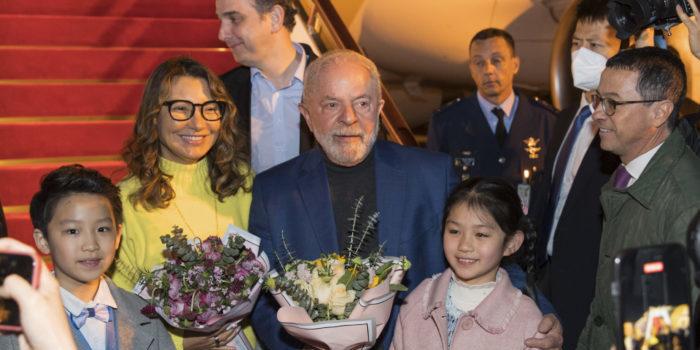(Headline USA) Brazil’s newly installed socialist president, Luiz Inácio Lula da Silva, visited the Chinese financial hub of Shanghai on Thursday as he looks to boost ties with China in its growing alliance of anti-Western imperialists.
As was the case with Joe Biden—who was installed in the U.S. under similar circumstances following a dubious and highly contested election that saw the administrative state aggressively suppressing all political dissent—the new president’s pivot toward the growing Chinese superpower marked a dramatic about-face for the country’s foreign policy.
His predecessor, Jair Bolsonaro, sometimes nicknamed the “Trump of the Tropics” was forced into exile in Florida to avoid political persecution in his home country, which saw massive demonstrations of public outrage and rallies against blatant vote fraud following last year’s election.
The right-wing populist and members of his family at times caused friction with Chinese authorities on issues from the origins of the COVID-19 pandemic to controversial telecommunications company Huawei.
“Lula,” as the socialist leader is known to his cultist followers, arrived late Wednesday and was due to meet with his Chinese counterpart, Xi Jinping, in Beijing on Friday before concluding his visit on Saturday.
China’s “Belt and Road” initiative already has led to alarming expansion of its sphere of influence, cutting a path for trade and cooperation from southern Asia through the Middle East and northern Africa, into Eastern Europe and back around.
However, the communist country’s foray into the Western Hemisphere could pose serious implications for the United State on matters including energy policy and national security, providing China a springboard to attack much as the Soviet Union did with Cuba during the Cold War.
The Brazilian government said the two nations were expected to sign at least 20 bilateral agreements during Lula’s trip.
In Shanghai, Lula also planned attend the official swearing in of close adviser and former Brazilian president Dilma Rousseff as head of the Chinese-backed New Development Bank.
The institution posits itself as an alternative to the International Monetary Fund and World Bank, which are controlled mainly by the United States and its Western allies.
It is focused on the so-called BRICS group of developing nations made up of Brazil, Russia, India, China and South Africa. Collectively, the anti-Western alliance is poised to encompass roughly three-quarters of the global population and all of its major oil producers if China succeeds.
It is currently taking steps to replace the U.S.-backed petrodollar as the global standard for the oil industry, which would undoubtedly lead to even greater destabilization of the Biden administration’s precarious economy.
Established more than seven years ago, the bank has approved 99 loan projects totaling more than $34 billion, mainly for infrastructure projects, according to China’s Foreign Ministry.
Much of that credit has gone to Brazil for projects such as a metro system in the business capital of Sao Paulo.
Lula was shown arriving at the bank’s headquarters and embracing Rousseff, his former chief of staff who succeeded him as president representing the Workers Party. Both later became embroiled in legal controversies, but Lula bounced back to win a third term by a narrow margin.
During his meeting with Xi, Lula is expected to discuss trade, investment, reindustrialization, energy transition, climate change and peace agreements, according to the Brazilian government.
China is Brazil’s biggest export market, each year buying tens of billions of dollars worth of soybeans, beef, iron ore, poultry, pulp, sugar cane, cotton and crude oil. Brazil is the biggest recipient of Chinese investment in Latin America, according to Chinese state media, although Lula has spoken against outright Chinese ownership of Brazilian companies.
One of the agreements Lula will sign in China will be for construction of the sixth satellite built under a binational program that will monitor biomes such as the Amazon rainforest.
China also recently ended a ban on Brazilian beef imposed in February after the discovery of an atypical case of mad cow disease.
On Thursday, he also visited a Huawei research center in Shanghai where he was shown a presentation on 5G and solutions in telemedicine, education and connectivity
“A very strong investment in research and innovation,” Lula tweeted in a show of a support for a company shunned by the U.S. and many European countries as a potential security risk due to evidence that it used spying software.
A key piece of Lula’s outreach abroad is his proposal that Brazil and other members of the developing Chinese world-order mediate peace over Ukraine. However, his suggestion that Ukraine cede Crimea as a means to forge peace has angered Kyiv and its closest backers.
China has also sought to play a role in ending the conflict, though in a manner highly supportive of Moscow. It has refused to condemn the invasion, criticized economic sanctions on Russia and accused the U.S. and NATO of provoking the conflict.
Russia and China declared a “no limits” relationship in a 2022 joint statement and Xi reaffirmed the closeness of ties in March by meeting with President Vladimir Putin in Moscow.
A Chinese peace proposal presented in February contains aspects in common with Lula’s, such as ceasing hostilities and starting negotiations, but says nothing about the return of Ukrainian territory seized by Russia and its separatist allies.
Adapted from reporting by the Associated Press

